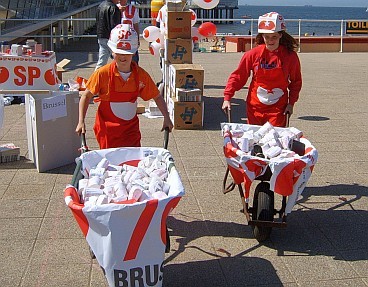Latest news
-
Choosing peace
27 December 2024
-
Europe lecture
24 May 2024
-
Peace Day 2024
17 April 2024
-
Dutch parliament must keep control of arms exports
29 February 2024
-
Stop the war
24 February 2024
-
SP success: The Netherlands must work to appeal to frozen Russian billions
15 February 2024
-
We need a ceasefire now!
14 November 2023
-
SP proposes law for substantial increase in minimum wage
4 November 2023
-
Parliament backs SP: Netherlands must work towards global billionaire tax
27 October 2023
-
Stop the violence and recognize a Palestinian state
23 October 2023
-
Majority of House supports SP motion to lift blockade on Gaza
17 October 2023
-
Two-thirds majority supports binding corrective referendum
10 October 2023
-
Three questions for Jasper van Dijk about Palestine and Israel
9 October 2023
-
SP Success: Wealthy municipalities must also shelter refugees
3 October 2023
-
SP launches Manifesto: United against disparity
23 September 2023
-
SP Conference – Marijnissen calls on the parties to unite and stop the division
23 September 2023
-
Success: No price hikes at the pump and in public transport
21 September 2023
-
Public responds via the Health Care Hotline: we want investments, not budget cuts!
19 September 2023
-
The Cabinet is allowing poverty to increase – unacceptable!
19 September 2023
-
“Prinsjesdag” Protest
17 September 2023
-
Start of parliamentary inquiry into benefits scandal
7 September 2023
-
Now for the people: Draft election programme presented
1 September 2023
-
We must prevent another Hiroshima
7 August 2023
-
Lilian Marijnissen elected SP leading candidate
1 August 2023
Copyrights: Creative Commons bnd (tenzij anders vermeld)

 While the conclusions of the Dutch Parliamentary Commission on the financial crisis, chaired by SP member Jan de Wit, can count on broad cross-party support, the European Parliament’s equivalent body is heading for a confrontation, with the centre-right European People’s Party (EPP) and the centre-left Socialists and Democrats (PSD) attempting to block input from other groups. Prospects are that no common report will be possible in which the causes of the crisis are properly analysed and policy recommendations made as to how a further crisis might be prevented. This represents a missed opportunity.
While the conclusions of the Dutch Parliamentary Commission on the financial crisis, chaired by SP member Jan de Wit, can count on broad cross-party support, the European Parliament’s equivalent body is heading for a confrontation, with the centre-right European People’s Party (EPP) and the centre-left Socialists and Democrats (PSD) attempting to block input from other groups. Prospects are that no common report will be possible in which the causes of the crisis are properly analysed and policy recommendations made as to how a further crisis might be prevented. This represents a missed opportunity.
